Hugh Jackman X-Men Origins Wolverine Interview
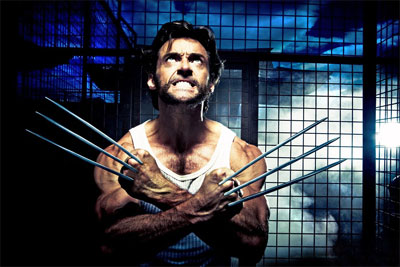
HUGH JACKMAN REPRISES THE ROLE THAT LAUNCHED CAREER.
EXCLUSIVE Hugh Jackman, X-Men Origins: Wolverine Interview by Paul Fischer.10 years ago when we first met, Hugh Jackman was barely known. How the mighty have risen. Yet, as anyone who knows the lconic Aussie actor, also knows that you see is what you get. Hugh Jackman, the actor has not changed despite his extraordinary success. A Tonyu-award winning Broadway actor, a movie star, producer and recently he added Oscar host to a resume that continues to grow. Hugh Jackman is all too aware that he has much riding on his latest film, X-Men Origins: Wolverine, the prequel to the franchise that started it all. He is both star and producer, but if he feels any pressure, he is not showing it. With sense of humour intact, we are sitting in an office on a soundstage at 20th Century Fox Studios, as we chat about X-Men, acting and family in this candid chat.
PAUL FISCHER: When you got the first X-Men movie, you were obviously relatively unknown outside of Australia.
HUGH JACKMAN: Even within Australia, I think.
PAUL FISCHER: And I'm just wondering whether or not you're surprised that that movie has done what it has done for you. Looking back, what surprises you the most about this career trajectory?
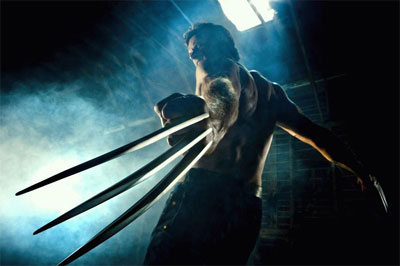 HUGH JACKMAN: If you'd asked me to play a game of - "Okay, you're going to have a Hollywood career. What would be the movie that would break you?" This would be a million miles away from what I would have -- I never in a million years would have guessed it would be this. I knew it was a great role once I read the script, and I was into it. I knew nothing about the comic book, but I'm like, "This is Mad Max, and this is kind of Dirty Harry. This is a Hans Solo antihero thing that I kind of grew up with. I get - I think I'm onto a great role here." I knew I was onto something good. But nobody knew what would happen with the series. Nobody. I mean, I remember several people saying to me, "Make sure you book another gig before this thing comes out." You know, try and use it, the leverage to get another job. Because the word on the street is, it's probably not going to do great business.
HUGH JACKMAN: If you'd asked me to play a game of - "Okay, you're going to have a Hollywood career. What would be the movie that would break you?" This would be a million miles away from what I would have -- I never in a million years would have guessed it would be this. I knew it was a great role once I read the script, and I was into it. I knew nothing about the comic book, but I'm like, "This is Mad Max, and this is kind of Dirty Harry. This is a Hans Solo antihero thing that I kind of grew up with. I get - I think I'm onto a great role here." I knew I was onto something good. But nobody knew what would happen with the series. Nobody. I mean, I remember several people saying to me, "Make sure you book another gig before this thing comes out." You know, try and use it, the leverage to get another job. Because the word on the street is, it's probably not going to do great business. So I think I was shocked when it came out, and things definitely changed for me. But - I mean, you know. I mean, anybody who knows me wouldn't pick a character like this to be the thing that I would be known for. And I was sort of thrilled, in a way, that I got it first. Because once you start doing talk shows, and people start to see your personality, it gets harder and harder to get away from that. So the fact that this was first means I got a role that I probably never would have got if I'd been known for something else. Let's say it was a romantic comedy, or something more straight down the line - you know, I probably never would have got this part.
PAUL FISCHER: How protective do you feel about this latest movie, versus the other X-Men? Because this is really you front and centre.
HUGH JACKMAN: I mean, there's no less effort, or desire that goes into every role. Every film has that sense for me as an actor. But obviously this movie has a different dimension as a producer. And particularly, I found myself yesterday asking everyone what they thought of the movie, and I was nervous about it. Because, you know, individually and - Gavin, everybody here - and I know Lauren's also here - the producer from X-Men I- in that way, I feel it's more personal to me. it's more my baby. And I've asked all these actors, and Gavin, the director, to come on board. And so obviously I'm more attached to it. It feels more personal. And that's the difference.
PAUL FISCHER: What was important to you about including more of Wolverine's relationships in this, as well as the action because a lot of the comic fans were just expecting the action. So, how did you feel?
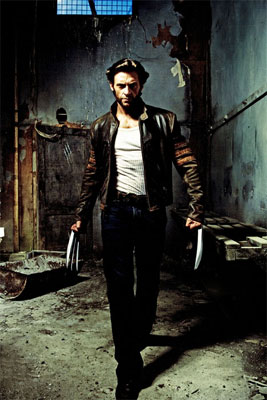 HUGH JACKMAN: I don't think that's true. I think comic book fans have loved Wolverine the character - in fact, all the X-Men characters-for more than the action. I think that's what set it apart from any of the other comic books. That you have - in the case of Wolverine, when he appeared, a revolution, really. He was the first antihero. And there was not just good guys versus bad guys, but an internal battle of good and bad going on within the character. That's why people relate to them. Yeah, they're cool and they've got claws, or they can do amazing things with swords, cards, all the great fun stuff. But each one of them has a personal battle going on. And that's why audiences can relate. So, yes, first priority of this movie is for it to be fun. I want people to come and have a great time. I want them to entertained. I want them to go see it on a big screen with their friends, or whoever, and just have a great time, but I think what we have an opportunity to deliver - and this is in the comic book itself - is also make them think a little bit. Make them feel. And take them on a journey through these characters.
HUGH JACKMAN: I don't think that's true. I think comic book fans have loved Wolverine the character - in fact, all the X-Men characters-for more than the action. I think that's what set it apart from any of the other comic books. That you have - in the case of Wolverine, when he appeared, a revolution, really. He was the first antihero. And there was not just good guys versus bad guys, but an internal battle of good and bad going on within the character. That's why people relate to them. Yeah, they're cool and they've got claws, or they can do amazing things with swords, cards, all the great fun stuff. But each one of them has a personal battle going on. And that's why audiences can relate. So, yes, first priority of this movie is for it to be fun. I want people to come and have a great time. I want them to entertained. I want them to go see it on a big screen with their friends, or whoever, and just have a great time, but I think what we have an opportunity to deliver - and this is in the comic book itself - is also make them think a little bit. Make them feel. And take them on a journey through these characters.PAUL FISCHER: You talk about reinterpreting the character. Was there a sense of really trying to reinterpret him, and make him a little bit different from the Wolverine characters that fans have known from the previous X-Men movies?
HUGH JACKMAN: You know, one is always going to hear a critique of how they played the part, what I should have done differently, and what I could do the next time if I ever get a shot at it. So I knew exactly what fans want. I'm not just talking comic book fans. I'm talking fans of the movie. And fair to say, I think by X-Men 3, Wolverine had got probably a little soft. And I kind of agreed with them there. I think what fans love about Wolverine, is his more, in a way, uncompromising approach to life. He is who he is. He's not always a nice guy. He has got edge. He's an antihero. And there's also vulnerability in there. There's conflict and battles going on in there, so with Gavin there was a chance to explore that more. I wanted the film to feel different. Gav and I talked a lot about that, the aesthetic of it, the tone of it. Probably a little darker, a little rawer, a little tougher and hopefully, maybe even a little more human, because I think that's really what has appealed to me about the comic book. And no more black leather suits.
PAUL FISCHER: What role do you think luck plays in one's career? I mean, do you think that had X-Men been a complete disaster, it would have taken you longer to have found yourself in this business? Do you ever look back and ask yourself, "What if?"
HUGH JACKMAN: Well, I had to ask that question, because there was a very complex situation at the time, with a movie, another movie I was going to do in Australia, and there was a conflict. In the end, it got resolved., but for about five days, I was going to be turning this down to make this other Australian movie. I'm usually probably a little fatalistic about those things. I think you go with your gut on things. Some things work out for you, some things don't work out for you. I've been in some movies that I was so proud of, and that have kind of come and gone, you know? And it's - I don't - nobody knows why. If I was a betting man, I would have thought something like The Fountain would have done more for my career than when I first did X-Men.
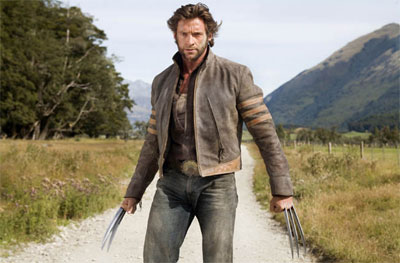 PAUL FISCHER: I loved all the movies that bombed, actually, of yours.
PAUL FISCHER: I loved all the movies that bombed, actually, of yours. HUGH JACKMAN: [LAUGHTER] The very first movie I did in Australia, Eskimo Kings-I think about eight people saw that movie.
PAUL FISCHER: Nine. I saw it.
HUGH JACKMAN: You saw it, too, but I kind of loved that performance, and I loved that film. And The Fountain, I loved. I think The Prestige is a really great movie I loved, and that sort of underperformed a little bit. I'm not sure why.
PAUL FISCHER: Do you remain philosophical about failure, as much as grateful about success? I mean, how do you balance those two sets of emotions?
HUGH JACKMAN: It's a great question. You have to be philosophical about it. In the last four or five years, things have changed for me. When I did The Boy From Oz, I was counselled not to do it by many people. Not my agent, actually, but many people said, "This is a bad time in your career to be going back on stage for 18 months, to take yourself out of the game, to play a gay character. This is not the way you do it." And I'd been offered it before, and had turned it down for that very reason. Because in my head, I, at the time, wanted to get out of musical theatre and get into film. So I said, "I just can't do another musical." When I saw it on stage, with Todd McKenney in it, I thought, "I just gave up one of the great theatrical roles." So when Ben Gannon rang me and he was halfway through asking me about Broadway, I said, "Oh, I'm in. I'm doing it." I didn't want to mess that up again. And that thing changed my life. I mean, Spielberg saw me do a version of that show, and that's why, it was part of the reason behind getting the Oscars. He was sort of pushing for me doing that. I think Woody Allen's people saw that, and I got that film. Darren Aronofsky, I was not on his radar until he came and saw me in The Boy from Oz, and he came backstage. I'd met him at a party a couple times before. He came backstage and he says, "I think I have a script for you."
Now, it's funny how things changed for me. But when that musical came out, it got a really terrible review in The New York Times. Terrible and that's usually death for something on Broadway. Yet somehow, by the time we finished, we were breaking all records. So I thought, "Okay. Trust your own instincts. Sometimes there's"-it's not an, "I'm right and they're wrong." It was a certainty. I just had a certainty about it. It happens rarely in life. I had it when I met Deb. I had it when I wanted to have kids. I had it with The Boy from Oz. But there's really not a lot of time you have certainty. Whenever you have it, you've got to do it. I had it with this. Did I want to do a Wolverine movie? Yes. I had it with - I try to have that with everything I do, now. If I can have the luxury about being certain about it, for whatever reason, then no matter what happens, it's easy to live with it. It's so much easier to be philosophical about something not working, when you are 100 percent sure it was the right thing at the time.
PAUL FISCHER: How do you remain so egoless, because you haven't changed? I mean, you're exactly the same as you were then. How do you keep that lack of ego in check?
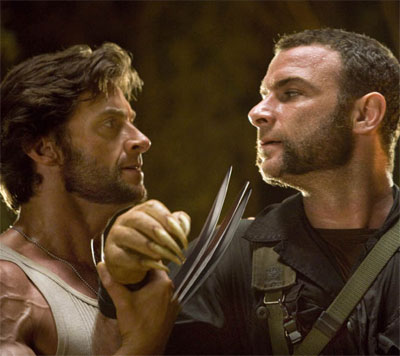 HUGH JACKMAN: Deb's a big key to that You know Deb and she's a person at times to a fault, honesty. Brutal. And she doesn't know any other way. I mean, for an actress, she's a terrible liar. She cannot lie. She just is very, very honest. And beyond that, when you're married to someone, as you know, who loves you for who you are - and someone who I met before any of this happened - I met her on my first job. I was a shmuck actor. Really, trust me, only $1200 a week on an ABC TV Series in Australia. There was nothing about me that was saying, "Hey, this is a good bet here." And when you know that you're loved completely for who you are, no matter what comes and goes - and by the way, this went through my mind when I walked out on stage at the Oscars. When I went out in The Oscars, the first person I looked for was Deb. And she gave me a little nod. And it's that feeling of, like, "I could completely die on my ass here, and I know that that's okay. Here." The entire industry could fall out of love with me, or whatever - however they were in love with me. Everything could fall apart. But when you know there's a rock there, that goes a long way, particularly in this business. But the other thing is, I think - sorry to interrupt that little - go on a bit too much. But - maybe just being a little bit older. But, you know, I've always had a more - in my private life, a search for what is real. To me, that's the most important thing and I talk to my kids all the time. The things that are real - by definition, truth never changes. It doesn't change. You know. Days come and go. Beauty. Flowers come and go, and there's beauty in them. But the truth is always there. There's something essentially there. And you know that in a relationship with someone. It doesn't matter what goes on. Bodies change. Things go up and down. But there's a connection that is real. Father, child. That connection is always real. Fame will come, and it will go. There will come a day when we will die. This body will pass. But I believe that below that, or deeper than that, is something that is forever there. And that's what I try and focus on. And that takes a little bit of discipline, sometimes. But then you can somehow enjoy all of this other stuff.
HUGH JACKMAN: Deb's a big key to that You know Deb and she's a person at times to a fault, honesty. Brutal. And she doesn't know any other way. I mean, for an actress, she's a terrible liar. She cannot lie. She just is very, very honest. And beyond that, when you're married to someone, as you know, who loves you for who you are - and someone who I met before any of this happened - I met her on my first job. I was a shmuck actor. Really, trust me, only $1200 a week on an ABC TV Series in Australia. There was nothing about me that was saying, "Hey, this is a good bet here." And when you know that you're loved completely for who you are, no matter what comes and goes - and by the way, this went through my mind when I walked out on stage at the Oscars. When I went out in The Oscars, the first person I looked for was Deb. And she gave me a little nod. And it's that feeling of, like, "I could completely die on my ass here, and I know that that's okay. Here." The entire industry could fall out of love with me, or whatever - however they were in love with me. Everything could fall apart. But when you know there's a rock there, that goes a long way, particularly in this business. But the other thing is, I think - sorry to interrupt that little - go on a bit too much. But - maybe just being a little bit older. But, you know, I've always had a more - in my private life, a search for what is real. To me, that's the most important thing and I talk to my kids all the time. The things that are real - by definition, truth never changes. It doesn't change. You know. Days come and go. Beauty. Flowers come and go, and there's beauty in them. But the truth is always there. There's something essentially there. And you know that in a relationship with someone. It doesn't matter what goes on. Bodies change. Things go up and down. But there's a connection that is real. Father, child. That connection is always real. Fame will come, and it will go. There will come a day when we will die. This body will pass. But I believe that below that, or deeper than that, is something that is forever there. And that's what I try and focus on. And that takes a little bit of discipline, sometimes. But then you can somehow enjoy all of this other stuff.PAUL FISCHER: You know, apparently according to this article that I read about you this weekend, Deb falls asleep during some of your movies.
HUGH JACKMAN: A lot of them. [LAUGHTER]
PAUL FISCHER: I thought that was hysterical.
HUGH JACKMAN: In Kate and Leopold - I remember Harvey Weinstein said, "Wake your wife up." It was right in the middle of a thing, and Harvey was right behind us. Deb actually really likes that movie. She has a kind of narcolepsy that happens in movies. She sits low, gets comfortable, it's dark-- and falls asleep. She's got two speeds. Stop and go. She stops, and she just falls asleep. She's fallen asleep in more plays, let me tell you, and more movies. I'll never forget when we saw a production of Chess in Melbourne. She woke up, and for no reason, the middle of a scene, starts clapping. She was like this, and - "Oh! [CLAPPING] And it was - even the performers kind of stopped. It was so shocking. And Deb's like - oh. You know. That's my wife. Hopefully she won't fall asleep in this one. This is action-packed from beginning to end.
PAUL FISCHER: Is one of the reasons why you wanted to continue to produce is that there is, in the back of your mind, this feeling that one day the acting could go away? That you would like to continue to be involved creatively, perhaps, in film? Or is it just that you want the control over the material?
HUGH JACKMAN: It's more a state of mind, of taking responsibility for something. When you get to a certain point where you have that ability or power to be able to say - to be in a meeting and go, "Oh, I think we should cast this person," I think you should step up and do it. I also don't put my head in where I don't know what's going on. Marketing, I don't know about marketing. I don't really - I might want to make a comment about a trailer, or why this, or why that. But they're so sophisticated on another level, I'm not going to be a pain in their ass about it. But it's - where to put a camera? How many crew to have? Design, costume design? I don't really know about those things. Casting, who the director's going to be, where the story should go, and most importantly, what we should do with the character of Wolverine and what tone we should have for the movie - that's what's important to me. But I don't find producing the most fun. I find it quite difficult. It's quite a lot of conflicts. You probably get to know things about people on a crew that you probably prefer not to know. And as an actor, you probably have to know.
PAUL FISCHER: What about actor's agents, and dealing with that kind of thing?
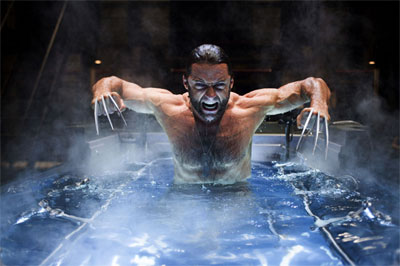 HUGH JACKMAN: Yeah. There's that. You find out far too much about people, in a way. But I didn't deal with a lot of that, because I didn't want to know too much. But I've always believed that when I graduated from drama school, me and my mate Simon Lyndon were like, "We're going to go start a theatre company." We're just going to get out there, and - just didn't want to be sitting there waiting for a phone call. And I don't care if you're waiting for Scorsese to ring, or if you're waiting for a theatre education company in rural Victoria to ring. It doesn't matter. It's a kind of very passive, and almost victim-like position to be in. And that's where I see actors getting a little bitter, and start blaming the industry, and blaming the world, and why am I cast? And I'm like - I want to say, "Just get up and do something." Whatever it is. If you like acting, get up and do it.
HUGH JACKMAN: Yeah. There's that. You find out far too much about people, in a way. But I didn't deal with a lot of that, because I didn't want to know too much. But I've always believed that when I graduated from drama school, me and my mate Simon Lyndon were like, "We're going to go start a theatre company." We're just going to get out there, and - just didn't want to be sitting there waiting for a phone call. And I don't care if you're waiting for Scorsese to ring, or if you're waiting for a theatre education company in rural Victoria to ring. It doesn't matter. It's a kind of very passive, and almost victim-like position to be in. And that's where I see actors getting a little bitter, and start blaming the industry, and blaming the world, and why am I cast? And I'm like - I want to say, "Just get up and do something." Whatever it is. If you like acting, get up and do it.PAUL FISCHER: Let me ask you about Australia. The country, not the movie.
HUGH JACKMAN: Yes.
PAUL FISCHER: Were you at the 20/20 conference held a year ago?
HUGH JACKMAN: Yes.
PAUL FISCHER: I guess it'll be a year since that summer.
HUGH JACKMAN: Yeah. We just had an e-mail from Mr. Rudd.
PAUL FISCHER: How gratifying was it for you to be a part of something like that? And do you want to continue doing more work in Australia? I mean, are you really determined to try to help the industry out as much as you can?
HUGH JACKMAN: I was unbelievably grateful to be a part of that. I just applied, like any other Aussie. I didn't make any phone calls to anybody. I just thought, there are not many people I know who wouldn't want to be part of that conversation about the future next - I don't know, 12, 15 years of the country, and where it's going. And I'm fascinated by leaders of certain areas, to hear what their ideas are, and their creativity. What's doing. So, it was an amazing weekend. It was a very optimistic, positive - I know there was cynicism amongst the press. But to be there was incredibly positive. And really exciting. And I do have a production company down there. Precisely, the wing of our company down there is to help facilitate work being done. And we're constantly trying to do that. And yes, of course I would love to be involved. That's - I feel very indebted to kind of the beginning I had for many places in Australia. And I support those institutions. WAPA, and I support the Actors Center in Sydney, and all those places, that really kind of gave me the grounding that I'm forever grateful for.
PAUL FISCHER: What are you doing next?
HUGH JACKMAN: I don't know.
PAUL FISCHER: Really?
HUGH JACKMAN: I do know - there's three things I'm really, really searching - or, not - I'm really heavily into, at the moment. I'm not sure which one would be next, and I'm not sure what the ramifications would be, if I do one. If the other one will go away. Or, blah, blah, blah. So that's why I can't really talk about it. But we are developing - one of the things I hope to do in the next 12 months is a movie musical based on Carousel, which we finally have a first draft for. We've been working on for three years.
PAUL FISCHER: Do you have the rights to the music?
HUGH JACKMAN: Yeah. I think it's the greatest musical ever written.
PAUL FISCHER: A studio film here at Fox?
HUGH JACKMAN: Well, we're still waiting to set it up, but hopefully. It's looking good, so, that's good.
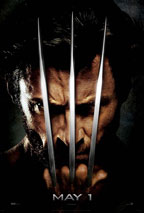
X-Men Origins Wolverine
Starring: Hugh Jackman, Liev Schreiber, Danny Huston, Dominic Monaghan, Ryan ReynoldsDirector: Gavin Hood
Genre: Science-Fiction/Fantasy
Hugh Jackman reprises the role that made him a superstar - as the fierce fighting machine who possesses amazing healing powers, retractable claws and a primal fury. Leading up to the events of... Hugh Jackman reprises the role that made him a superstar - as the fierce fighting machine who possesses amazing healing powers, retractable claws and a primal fury.
Leading up to the events of X-Men, X-Men Origins: Wolverine tells the story of Wolverine's epically violent and romantic past, his complex relationship with Victor Creed, and the ominous Weapon X program. Along the way, Wolverine encounters many mutants, both familiar and new, including surprise appearances by several legends of the X-Men universe whose appearances in the film series have long been anticipated.
More Hugh Jackman Interviews:
Hugh Jackman Australia - www.femail.com.au/hugh-jackman-australia-interview.htm
Kate & Leopold - www.femail.com.au/kateleopold.htm
www.femail.com.au/ma_hughjackman.htm
Someone Like You - www.femail.com.au/someonelikeyou.htm
The Fountain - www.girl.com.au/hugh-jackman-the-fountain-interview.htm
Other Related Articles
Baz Luhrmann's Movie Epic Australia - www.femail.com.au/australia-movie.htm
George Miller Happy Feet - www.femail.com.au/george-miller-happy-feet-interview.htm
More X-Men & Wolverine Interviews:
Liev Schreiber - www.girl.com.au/liev-schreiber-defiance-wolverine-interview.htm
X-Men - Wolverine's Story - www.femail.com.au/x-men_wolverines_story.htmX-Men The Last Stand DVD - www.femail.com.au/x-men-the-last-stand-dvd.htm
MORE
- Viggo Mortensen The Road
- 24 Cast Reunion
- Aaron Eckhardt No Reservations
- Aaron Eckhart The Dark Knight
- Adam McKay Step Brothers Interview
- Alan Alda Diminished Capacity Interview
- Alan Alda Diminished Capacity Interview
- Alex Dimitriades
- Al Pacino Oceans 13
- Alan Rickman Snow Cake
- Alan Rickman Sweeney Todd



